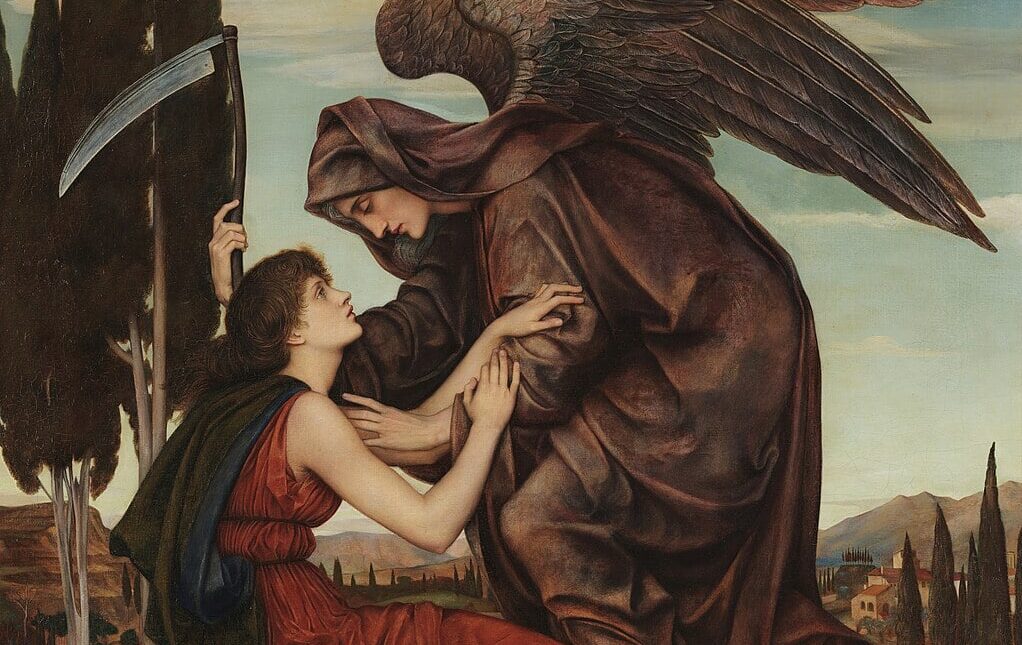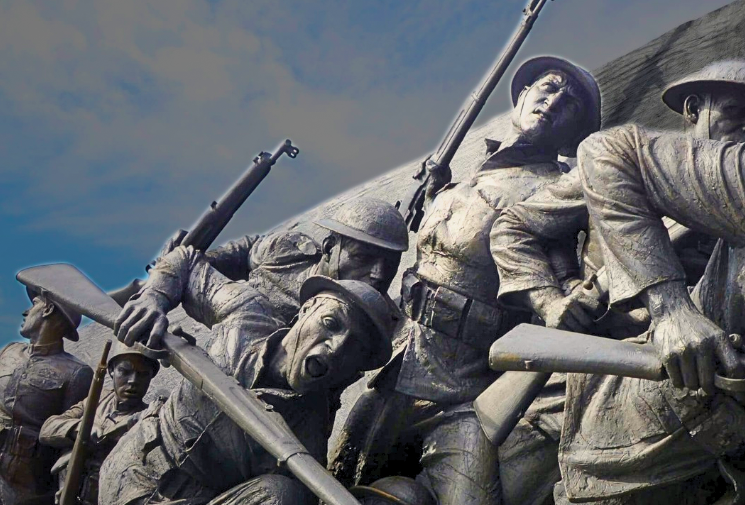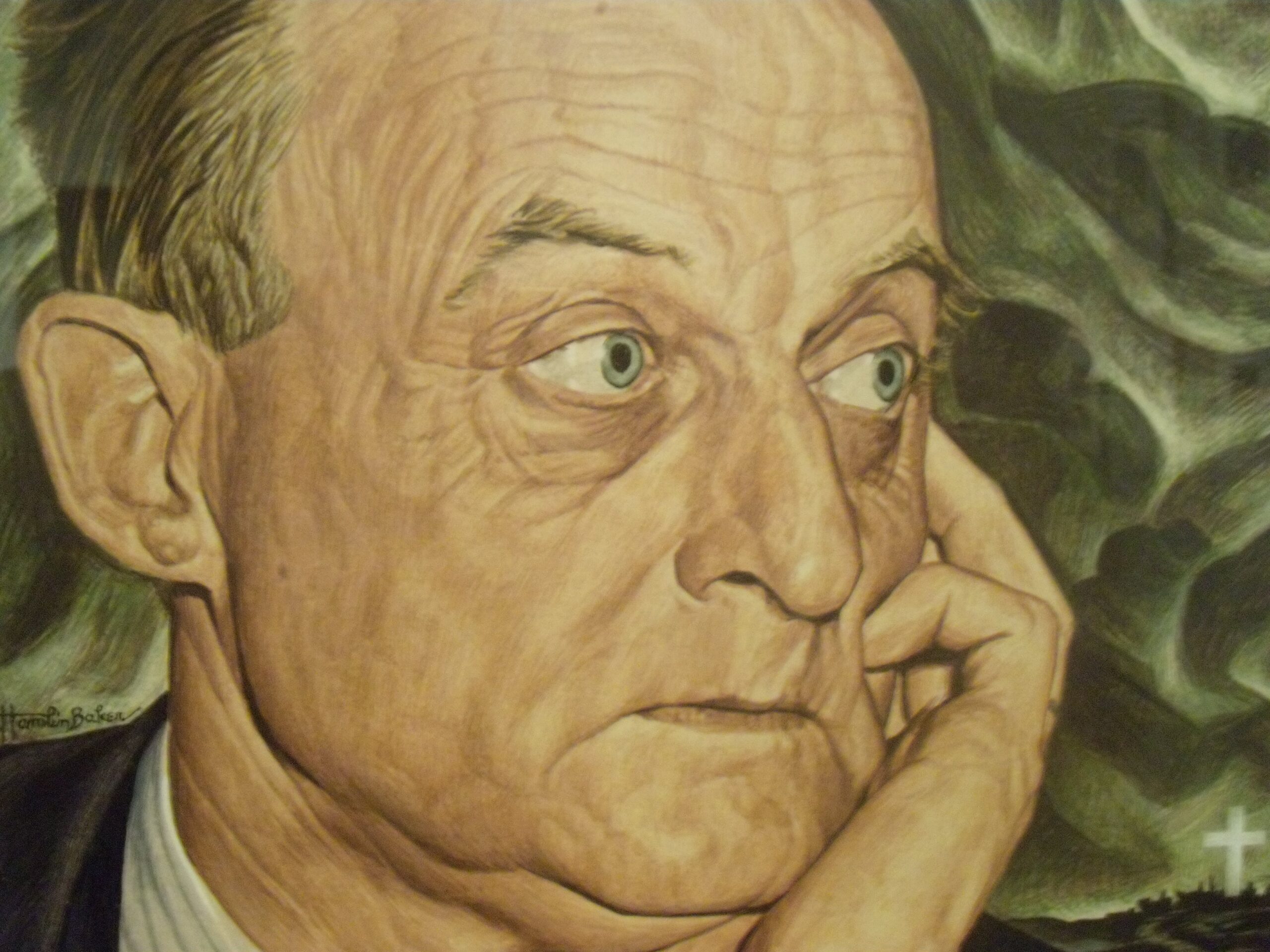George Orwell is recognized today as one of the most original political writers of the twentieth century, particularly in his understanding of the evils of communism, most famously expressed in Animal Farm (1945) and Nineteen Eighty-Four (1949). While Orwell’s anticommunism dates back to the mid-1930s, especially his experience during the Spanish Civil War, he was at first less insightful about the other great totalitarian movement of that “low, dishonest decade,” fascism. (Orwell rarely distinguished between fascism and Nazism.) The outbreak of war in September 1939 and, in particular, the fall of France in the summer of 1940 clarified Orwell’s recognition of the danger that Nazism posed for England.
Orwell’s critique of communism is both incisive and original. He was among the first writers to recognize that communism was not a revolutionary force but instead was a new, dangerous form of totalitarianism, a powerful tool for controlling the masses. Conversely, his initial comments on fascism were curiously flat and imitative of the standard left-wing interpretation—that is, fascism was nothing more than the capitalist system in extremis.
Despite his personal, if somewhat idiosyncratic, commitment to socialism, Orwell’s critique of communism, and especially his belief that Stalin was a bloody-minded monster, made him anathema in leftist circles throughout his life. His own position as a strong leftist made his criticism of communism and its fellow travelers in England sting even more.
Orwell’s political education was a gradual process. Five years as a member of the Imperial police in Burma (1921–27) left him with views that can best be characterized as vaguely radical. In fact, he was described in the early 1930s as a Tory radical, someone in the mold of William Cobbett or Orwell’s personal hero, Charles Dickens. As he admits in the autobiographical section of his analysis of poverty in the north of England, The Road to Wigan Pier (1937): “I seem to have spent half the time in denouncing the capitalist system and the other half in raging over the insolence of bus-conductors” (141).1
Orwell’s political education began when he ventured among the poor, the downtrodden, and the tramps after his return from Burma. His book Down and Out in Paris and London was an attempt to show the impact of his time among the lowest rungs of society. He wrote that he wanted to purge himself from all the evils of imperialism and thought that by immersing himself among the poor he would do so. His first serious publications appeared in the unconventional English left-wing journal Adelphi, which provided an outlet for him to develop his ideas and where the evidence of his unique direct prose style first appeared. He also wrote occasional pieces for the New English Weekly, which, like Adelphi, was idiosyncratically socialist. These contacts put him in touch with individuals drawn from all parts of the leftist spectrum: anarchists, pacifists, socialists, Trotskyists, and communists. His political ideas were unformed but definitely radical and anticapitalist.
By the time Orwell left to take part in the Spanish Civil War, in December 1936, his emerging left-wing views had been sharpened by his time among the unemployed in the north of England. In Wigan Pier, which appeared while he was in Spain, he elaborated some of his unique opinions about socialism. For socialism to prevail, he wrote, it must lose its image as appealing to “unsatisfactory or even inhuman types” (182). In an oft-quoted passage, he wrote that most people regarded socialists as a collection of the strange and the odd. “One sometimes gets the impression that the mere words ‘Socialism’ and ‘Communism’ draw towards them with magnetic force every fruit juice drinker, nudist, sandal-wearer, sex-maniac, Quaker, ‘Nature Cure’ quack, pacifist and feminist in England” (174).
One of his most original insights from his experiences in Wigan was that for socialism to triumph, the middle classes must show empathy for, and merge their interests with, those of the proletariat. A running theme through the second part of Wigan Pier is Orwell’s argument that the gulf between the middle and lower classes can be bridged. After all, he notes, the middle classes have nothing “to lose but their aitches” (232).
* * *
Spain completed Orwell’s commitment to socialism as well as sharpening his hatred of communism. There he joined the anarchist-Trotskyist party, POUM (Partido Obrero de Unificación Marxista), spending six months with them, including time in the front lines. He was shot through the throat and almost died before returning to England in June 1937.
In England, he saw his anarchist Trotskyist friends in Spain denounced by leftists of all stripes as enemies of the revolution and, what is worse, crypto-fascists. One of the popular communist posters during the war showed the Trotskyite POUM with a mask beneath, which was the face of fascism. He never forgave those in England who took part in this political assassination of his Spanish comrades. He returned from Spain as a dedicated anticommunist and, as he told his old friend Cyril Connolly, for the first time he was a true believer in socialism.
Orwell’s understanding of the other great “ism” of the twentieth century, fascism, took a longer time to mature than did his unique insights into communism. Orwell never found anything appealing in fascism, which was an example of an evil political concept that threatened the very nature of democratic society. Unlike communism, which Orwell detested while recognizing its appeal to certain idealistic types, fascism had no redeeming value. As Orwell was groping toward an understanding of the complexities of socialism, he continued to accept the standard left-wing view that fascism was a logical extension of capitalism. As late as 1936, when Orwell’s first serious insights into the flaws of socialism and communism were developed, he showed no interest in the nature and spread of fascism.2
In 1937, with his socialist education complete, Orwell told the social anthropologist Geoffrey Gorer that fascism was just a development of capitalism and “the mildest democracy, so-called, is liable to turn into fascism when the pinch comes”3 (CEJL, 1:284). After returning from Spain, Orwell joined the Independent Labour Party, the most radical and pacifist of the left-wing movements in England. He agreed with their rejection of the idea of war against fascism because he believed that, in toppling the fascist system, you would only be stabilizing capitalism and imperialism, “something that is far bigger and in a different way just as bad” (CEJL, “Not Counting Niggers,” 1:397).
Before Orwell could clarify his thoughts on fascism, he had to deal with his deeply held conviction that imperialism remained a dangerous threat to democracy. Orwell’s service in the British Empire still haunted him. References to the evils of imperialism crop up repeatedly in his writings through the 1930s and 1940s. Unlike fascism, which he continued to be unclear about, imperialism still rankled him as a great evil. Perhaps his best piece of creative writing in the 1930s, the essay “Shooting an Elephant” (1936), reflects this most clearly. Orwell took an otherwise commonplace incident—the killing of an elephant running amok to satisfy a Burmese mob—and derived a universal lesson about the evils of imperialism. “When the white man turns tyrant,” he noted, “it is his own freedom that he destroys” (CEJL, 1:239).
Orwell’s thinking about fascism remained simplistic and typical of many English leftists until the approach of war. By 1938 he was distancing himself from his fellow leftists with regard to the significance of fascism. A letter to an old friend, the proletarian author Jack Commons, in December 1938 reveals that Orwell’s thinking about fascism was changing. It was necessary, he wrote, to investigate fascism seriously because there was more to it than most socialists believed. After all, according to the left-wing press, Mussolini has been “just about to collapse since 1926” (CEJL, 1:370). Also the standard left-wing view that Hitler was just a creature of German businessmen seemed increasingly puerile as the führer solidified his power over every corner of German life. He had purged the German army of elements disloyal to him and dispatched the leading exponent of German capitalism, Hjalmar Schacht, from power by 1938.
Orwell was beginning to reexamine his initial view of fascism as little more than an extension of degenerative capitalism. He developed the argument, rare among those on the Left, that fascism was linked to socialism—a kind of grim distortion of socialism, but in its way a mass movement with populist appeal. This was a major heresy, since all left-wing groups regarded fascism as counterrevolutionary and reactionary.
* * *
As Orwell began to think critically and systematically about fascism, his ideas on it began to crystallize. In his essay “My Country Right or Left,” he tells us that he woke to the news of the signing of the Nazi-Soviet pact on August 24, 1939, and knew that his pacifist sympathies were irrelevant. “I was a patriot at heart, . . . would support the war, would fight in it if possible” (CEJL, 1:539). With England’s survival at stake, Orwell wrote, he knew that he would fight. As he noted in his review of Malcolm Muggeridge’s The Thirties, like Muggeridge he was brought up with a sense of traditional loyalty to England. “It is all very well to be ‘advanced’ and ‘enlightened,’ . . . but a time comes when the desert is sodden red and what have I done for thee, England, my England” (CEJL, 1:533–35). In a sense, Orwell believed that in order to fight fascism it was necessary to reject pacifism—he would label pacifism and its followers as objectively pro-fascist for the rest of the war. Orwell was using patriotism as his rationale to justify a war he had previously denounced.
Orwell’s rediscovery of his sense of patriotism deepened his understanding of how fascism had used patriotic and nationalist concepts to win over the masses. In his argument that patriotism must play a major role in rallying the middle and working classes to fight against fascism, Orwell was one of the first intellectuals to remove the curse from this concept that had been in disrepute since World War I. Later in his essay “Notes on Nationalism,” written in May 1945 just as Nazi Germany was defeated, he would draw the valuable distinction between patriotism, which he regarded as a natural human sentiment, and nationalism, which he saw as a vehicle for one nation or group to dominate and control others.
Over a period of time, Orwell also came to recognize that neutrality in the face of fascism was no longer a viable stance. In his essay on Henry Miller, “Inside the Whale” (1940), he rejected as irresponsible Miller’s advice to stay aloof from politics because the West was doomed. Unless we fight fascism, Orwell argued, “the autonomous individual is going to be stamped out of existence” (CEJL, 1:493–527). The theme of the destruction of the individual by an all-powerful state would subsequently play a major role in Orwell’s thinking, reaching fruition in his portrait of Winston Smith in Nineteen Eighty-Four.
Orwell further angered his comrades on the Left by arguing that fascism and communism were not ideological opposites but instead shared similar views. In a review of Eugene Lyons’s book about his time in the Soviet Union, Assignment to Utopia, Orwell pointed out that both fascism and communism concentrate power in the hands of an elite, and that the working classes are reduced in both systems to “a status resembling serfdom” (CEJL, 1:370).
Orwell revealed that he was thinking differently about the significance of fascism in a review of Adolph Hitler’s Mein Kampf, which was published just before the Germans launched their blitzkrieg in the West in the spring of 1940. Orwell began by saying that he had never been able to dislike Hitler—just the kind of remark designed to irritate his fellow socialists. He even compares the expression on Hitler’s face in photographs to that of the crucified Christ, another shocking comparison. But Orwell’s key point, one that few on the Left would admit, was that Hitler’s success was connected to his understanding of “the falsity of the hedonistic attitude of life.” Orwell argued that all progressive thought since the Great War believed that the people wanted nothing beyond material success. Hitler and the fascists saw through this. “Hitler said to them,” Orwell writes, “ ‘I offer you struggle, danger and death,’ and as a result a whole nation flings itself at his feet” (CEJL, 2:14). Interestingly, the phrase resembles Winston Churchill’s famous speech to Parliament on May 13, 1940, after he assumed power in the midst of the German blitzkrieg in the West—“I have nothing to offer but blood, toil, tears, and sweat.”
Orwell wrote less and less about fascism as the war wore on. By 1942 he believed that the English wouldn’t develop a native form of fascism after all. He believed the English people, even the upper classes, possessed a sufficient sense of patriotism to reject an ideology that was antithetic to their past. In the final analysis, the English upper and middle classes, unlike the French, who gave into fascism without a struggle, were not corrupted by modern ideologies and possessed a sound moral core. England was a family, he would write later in his book The Lion and the Unicorn; perhaps one with the wrong people in charge, but a family nonetheless.
As the war progressed, Orwell’s references to fascism bear no comparison to his growing concerns about the rising threat of communism to the Western ideals of freedom. Orwell’s focus shifted to concerns about the appeal of communism, especially to the intelligentsia, a natural enough reaction given Russia’s major role in defeating the Nazis. He soon began developing his ideas about what the future would hold for the West, especially his growing fear that the idea of objective truth was disappearing and the dehumanization of the individual was taking hold, the very themes he would develop in his last two famous works, Animal Farm and Nineteen Eighty-Four. By the end of the war, Orwell noted that fascism had lost all concrete meaning and become a verbal means of vilifying your enemies, a point he made most clearly in his great essay “Politics and the English Language.” ♦
John Rossi is professor emeritus of history at La Salle University in Philadelphia. His new book, The Cambridge Introduction to George Orwell, was written with John Rodden.
1 The Road to Wigan Pier (New York: Harvest/HBJ Book, 1958), 141. Further references to this book will be given parenthetically in the text.
2 Bernard Crick, Orwell: A Life (Boston: Little Brown, 1980), 293.
3 The Collected Essays, Journalism and Letters of George Orwell, 4 vols., ed. Sonia Orwell and Ian Angus (New York: Harcourt Brace and World, 1968), 1:284. Further citations to this book will be given parenthetically in the text as CEJL.













